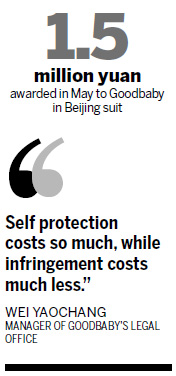
The Chinese baby stroller maker Goodbaby Group is planning to file a lawsuit in the United States against legendary US toy maker Mattel Inc claiming it infringed on patents for more than seven years.
The case centers around a multifunctional baby tricycle unveiled by the Jiangsu province company in 1997. It was later patented in many countries and regions including the US, Britain, Japan, Canada and Russia.
But in 2006, Goodbaby President Song Zheng found a three-in-one baby tricycle on sale in the US that has "similar designs" to his company's product.
Later Song learned that the tricycle made by Mattel had been on the US market for three years previous to his discovery, at a time when Goodbaby "already had an invention patent granted by the US Patent and Trademark Office for five or six years", he said.
Goodbaby's lawyer wrote letters to Mattel asking for cessation of the alleged infringement, but received no reply.
"Infringement in the US may be enough to cause a company to go bankrupt," said Wei Yaochang, manager of Goodbaby's legal office. "Chinese companies face many difficulties in defending their intellectual property rights.
"It's a high risk as they have to invest a great deal of time and money," he said. "The litigation expense alone will cost $2 million and total costs will reach at least $10 million. This is, without doubt, a heavy burden that young Chinese companies cannot afford."
Goodbaby was even more surprised in 2007 to find that Mattel's baby tricycle was on sale in a number of Chinese cities including Beijing, Shanghai, Guangzhou and Nanjing.
The Chinese company filed suit in Nanjing the following year and won all nine trials that ensued.
The Beijing High People's Court made a final verdict in May, ruling that Mattel infringed on Goodbaby's patent and must pay 1.5 million yuan ($232,950) in compensation to the patent owner.
Goodbaby insists it will "fight on to the end to defend itself, although the difficulty is huge", Wei said.
He noted there are still deficiencies in China's intellectual property rights protection because "self protection costs so much, while infringement costs much less".
"Many US companies pay great attention to patent protection for their own products, but often disregard infringement filings by companies from developing nations like us," said Song. "That's because they think the high litigation expense and long legal procedures will deter us."
Song also said it was expensive to apply for international patent protection and file international cases, but "we still insisted on doing it".
The company now has more than 2,200 patents, many of them granted abroad.
China Daily
(China Daily 08/03/2011 page16)
